A jaw massage is focused mainly on the muscles located around the jaw area. Muscles that can be found around the jaw area include the masseter and the temporalis. A jaw massage is effectively used to help treat pain, scarring and muscle tightness. Massage therapists at Physio.co.uk use a jaw massage to help decrease tension and increase relaxation.
What techniques are used in a jaw massage?
A range of techniques are used during a jaw massage. Techniques used during a jaw massage include:
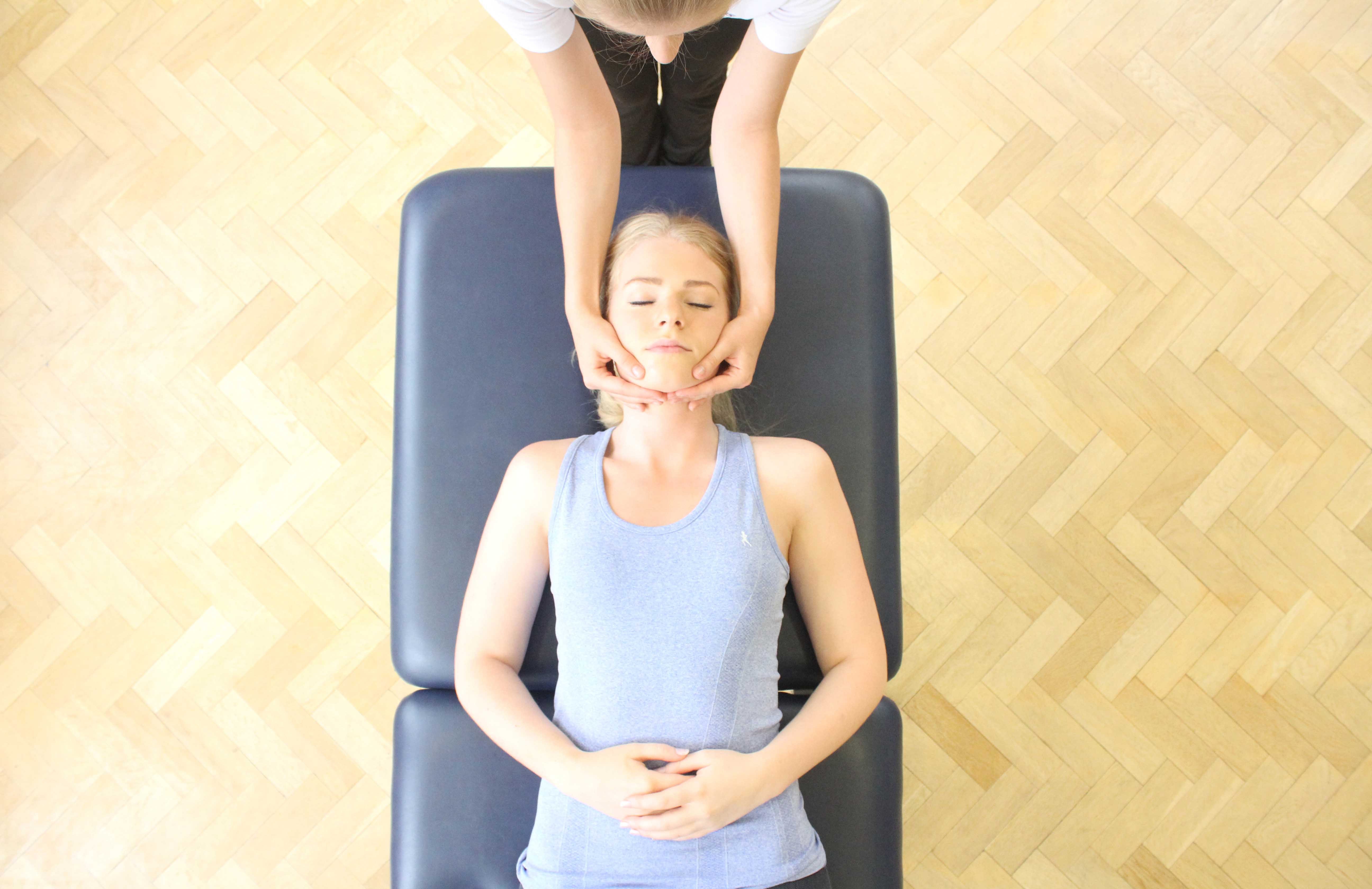 Above: Soft tissue massage of the jaw
Above: Soft tissue massage of the jawFrictions are an effective technique used during a jaw massage. Using the fingertips and thumbs, pressure is applied along muscle fibres. Pressure applied along muscle fibres helps to break down collagen fibres and reduce restriction. Frictions are used to increase temperature of muscles and encourage an increase of blood flow. An increase of blood flow helps to provide the muscles with essential nutrients and oxygen.
Trigger pointing can be used during a jaw massage. A trigger point can be found in the centre of a muscle fibre and can cause pain. During a jaw massage, pressure is placed upon trigger points to help break down knots and reduce muscle tightness. Trigger points encourage an ischemic reaction to occur due to the pressure being placed onto the knots and areas of tightness. An increase in pressure can restrict blood flow to this area. When pressure is reduced, an increase in blood flow is encouraged around the area. An increase in blood flow provides the muscles with healthy nutrients that help to repair damage and keep muscles strong.
Acupressure is a technique used during a jaw massage. Acupressure is performed using the fingertips or thumbs and pressure is placed on specific points. Each specific point can be an area of a build-up of tension or where muscular knots can be found. Muscular knots can cause pain and restriction if left untreated. Muscular knots are softened and tension is reduced as pressure is applied. Breaking down muscular knots and reducing tension helps to reduce restriction to decrease pain.
Skin rolling can be used during a jaw massage. Skin rolling is a technique performed using the fingers and thumbs. During skin rolling, skin is picked up and rolled between the fingers and thumbs to help stretch and loosen muscle and fascia. Loosening muscles and fascia helps to decrease tightness and restriction by increasing flexibility and elasticity. Decreasing restriction and tightness helps to reduce pain.
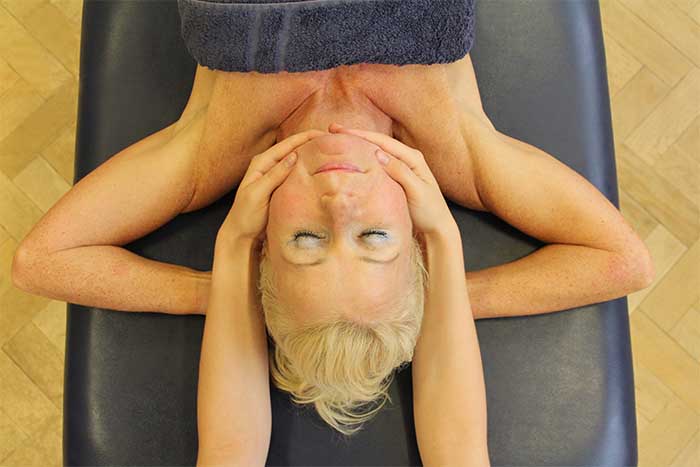
When can a jaw massage help?
A jaw massage can help in a variety of ways. The most common conditions a jaw massage can help include:
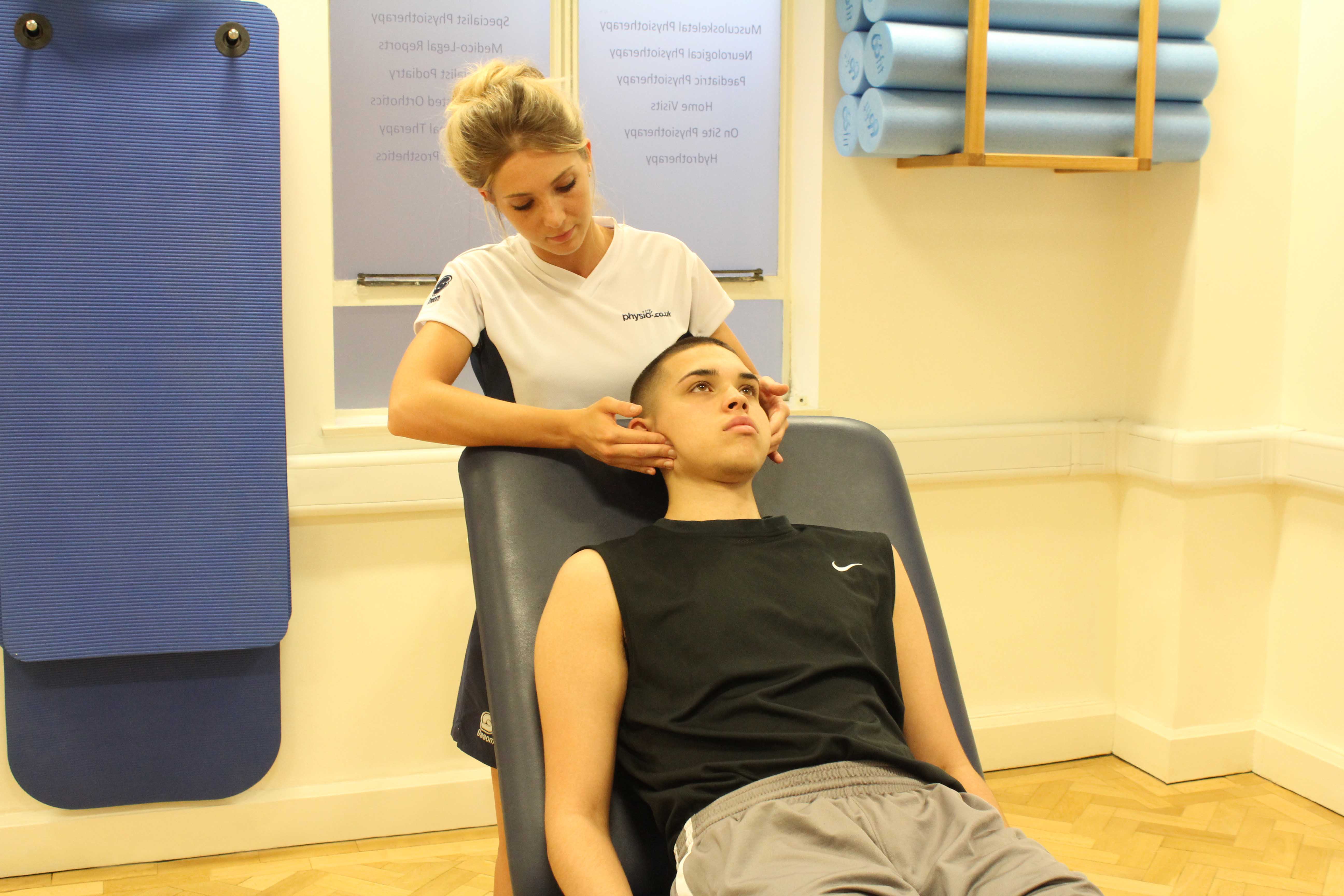 Above: Soft tissue massage of the temporomandibular joint
Above: Soft tissue massage of the temporomandibular jointHow does a jaw massage help tight muscles?
Tight muscles are often treated through a jaw massage. Tight muscles can often be a result of injury. Muscle tightness can create restriction resulting in an increase in pain.
A jaw massage aims to relieve tight muscles by increasing tissue and fascia elasticity.
Injury can result in muscles becoming restricted and tissue elasticity to decrease. During a jaw massage, blood circulation is improved. Improving blood circulation increases the temperature of muscular tissues. As temperature increases, inelasticity of muscular tissue decreases. Decreasing tissue elasticity allows muscle to stretch, increasing their range of movement. Increasing the range of movement of muscles decreases muscle tightness.
Fascia is a thin layer of connective tissues located beneath the skin. Fascia can be fibrous and easily restrictive. As muscle temperature is increased during a jaw massage due to the increase of blood circulation, the temperature of fascia also increases. The different techniques and strokes used within a jaw massage help to stretch and loosen fascia as its temperature continues to increase. Loosening fascia helps to further decrease restriction and increase muscle range of movement. Decreased restriction and increased range of movement further decrease muscle tightness.
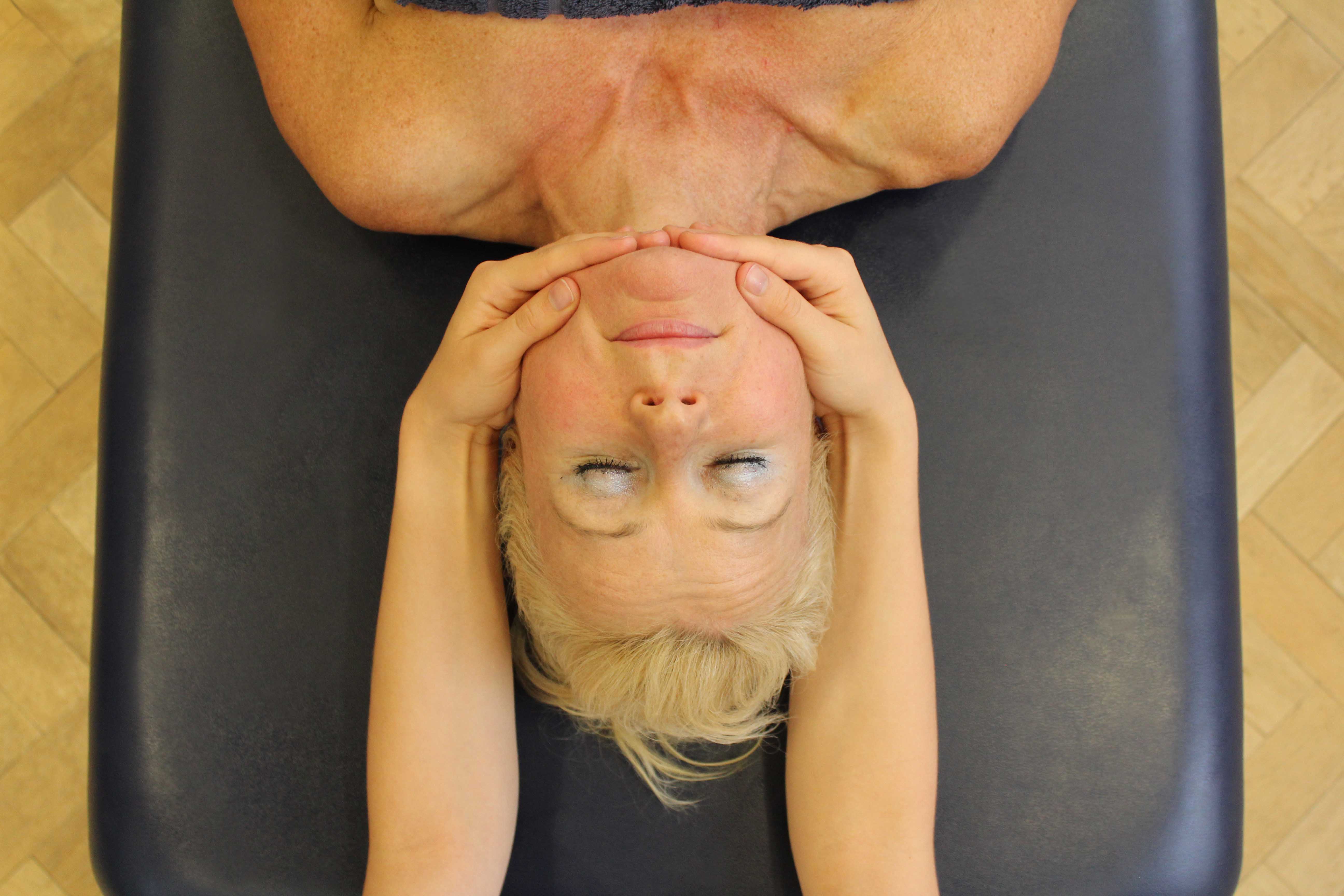 Above: soft tissue massage of the jaw
Above: soft tissue massage of the jawHow does a jaw massage help stress?
A jaw massage can help reduce stress. A person can be both physically and mentally affected by stress.
A jaw massage aims to reduce stress by decreasing negative hormones in the body and reducing muscular tension.
A jaw massage can help a person relieve stress mentally. A negative hormone called cortisol causes stress within the body. Too much stress caused by cortisol can increase the chances of anxiety and depression. A jaw massage helps to replace cortisol with more positive hormones to increase relaxation and decrease stress.
A jaw massage can also help reduce tension to physically relieve stress. Tension is caused by the constant contraction of a muscle. An increase in tension can worsen the feeling of pain a person has. Pain can result in a person being unable to relax and eventually become stressed. A jaw massage increases elasticity of muscular tissues to allow them to stretch and increase in flexibility. Elasticity is increased as the tissue temperature rises due to improved blood circulation. Increasing elasticity allows muscles to relax, reducing muscular tension and tightness.
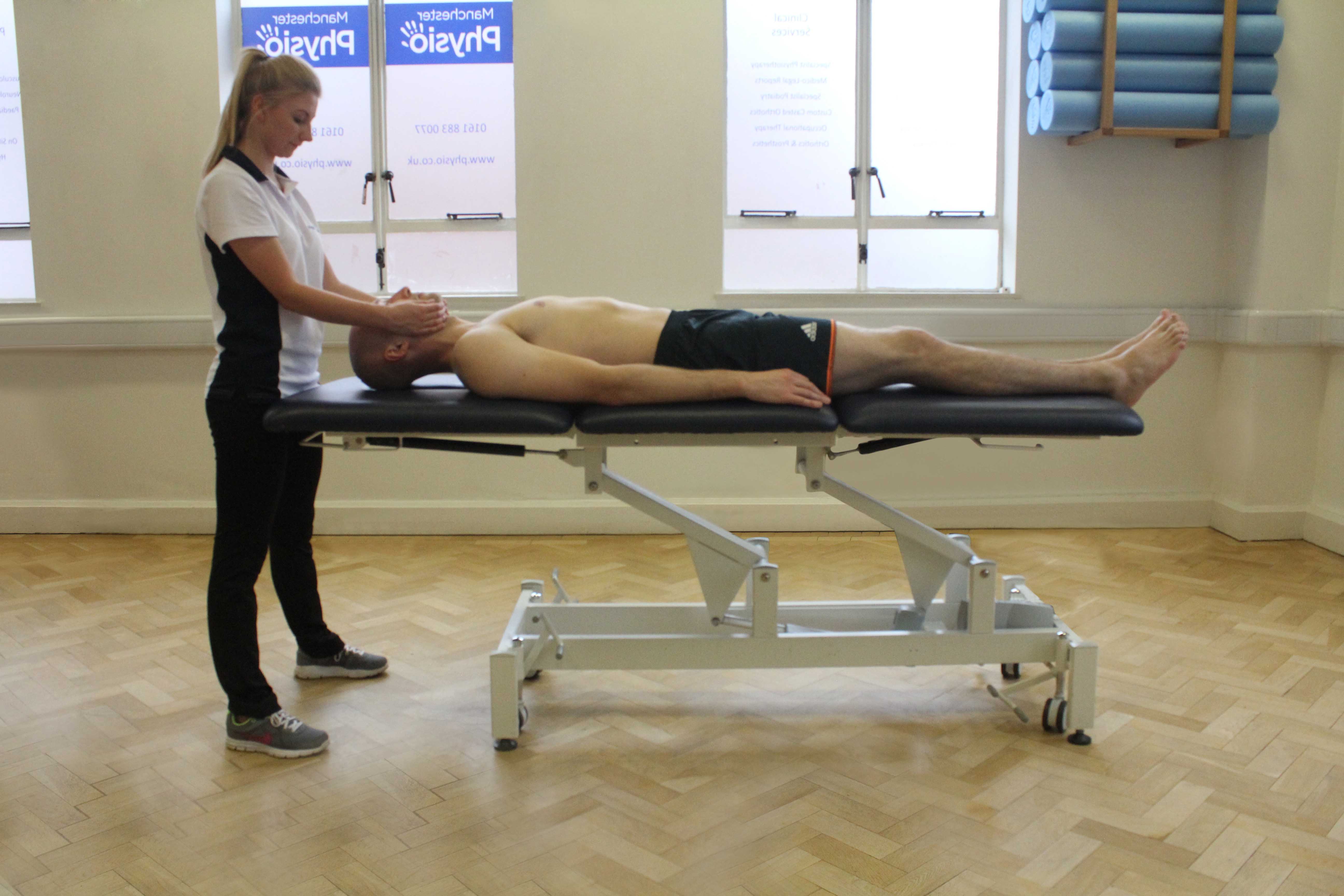 Above: soft tissue massage of jaw
Above: soft tissue massage of jawHow does a jaw massage help scarring?
A jaw massage can help reduce scarring. When skin is broken due to injury or surgery, a scar forms to replace the damaged skin. Scar tissue is formed to bring damaged fibres back together. Scarring can affect a person physically as it can be restrictive, however a person can also be psychologically affected due to their appearance.
A jaw massage helps to treat scarring by increasing circulation and decreasing their appearance.
A jaw massage encourages an increase in circulation by friction created between skin and fingers. As circulation increases, the temperature of scar tissue and collagen fibres rises. Increasing the temperature of scar tissue and collagen fibres helps them loosen and become less restrictive. Reducing restriction caused by scar tissue can help reduce pain, tightness and tension.
As temperature of collagen fibres is increased and scar tissue is softened, fibres start to realign. Fibres are able to realign as they are broken down to reduce their hardness. Realigning fibres helps to align fibres in the same direction as the body's natural skin fibres. Realigning fibres helps to reduce the appearance of scarring.
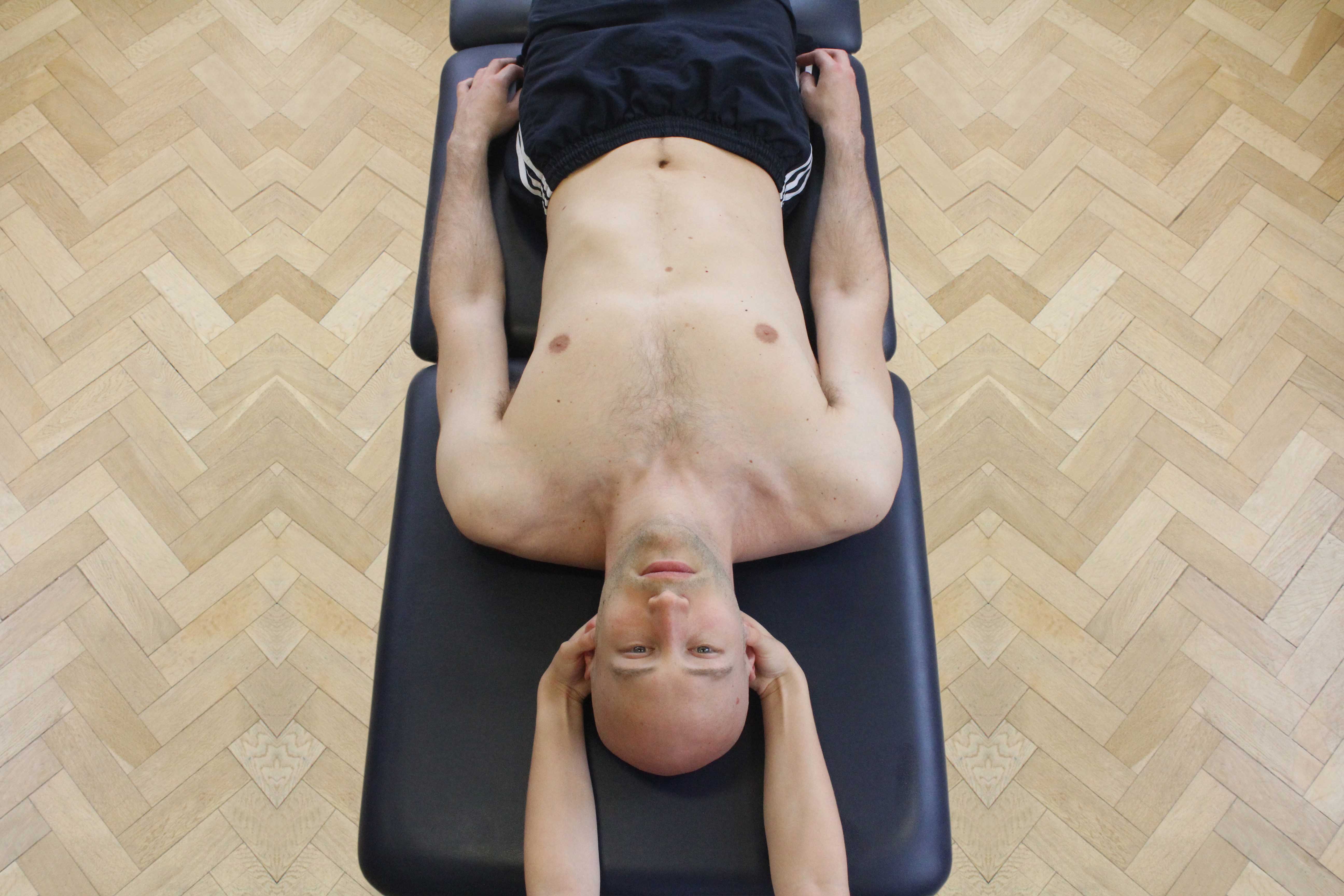 Above: Soft tissue massage of the temporomandibular joint
Above: Soft tissue massage of the temporomandibular jointWhat are the benefits of a jaw massage?
A jaw massage has wide ranging benefits. Benefits of a jaw massage include:
How does a jaw massage decrease pain?
A jaw massage can help decrease pain. Common causes of pain around the jaw area include injury, surgery and tight muscles. Pain occurs as receptors in the body sense something is wrong in the body so it sends a signal to the brain. The brain then sends a message to the nerves that then create a feeling of pain.
A jaw massage aims to decrease pain by disturbing the signal sent from the receptors to the brain.
During a jaw massage, friction created between the skin and fingers create a new feeling for the receptors to detect, interfering with the original sense that something is wrong. Once the new feeling has been detected, a different signal is sent to the brain. Due to a new signal being sent to the brain, the message sent to the nerves is different. A new message sent to nerves means they do not create a feeling of pain and instead will help to reduce pain.
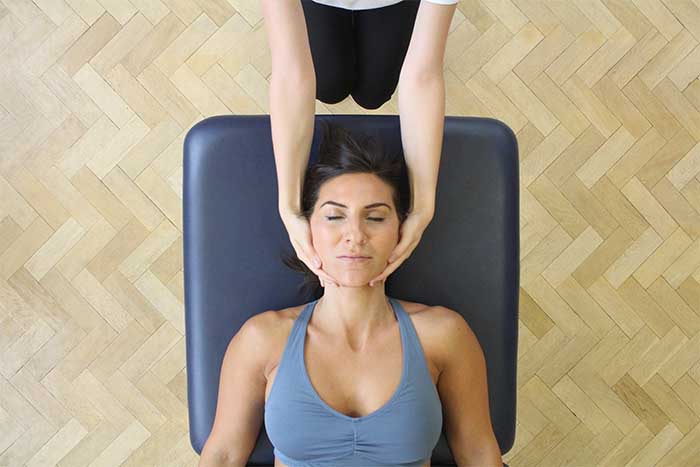
How does a jaw massage increase relaxation?
A common benefit gained through a jaw massage is increased relaxation. A jaw massage helps to relax a person both physically and mentally.
A face massage aims to increase relaxation by increasing positive hormones around the body and decreasing muscle tightness.
During a jaw massage the level of positive hormones within the body is increased. Positive hormones include endorphins, dopamine and serotonin. Positive hormones encourage relaxation and give a person a sense of well-being. Increasing positive hormones allows a person to mentally relax.
Tight muscles can decrease a person's level of relaxation. Tight muscles can cause a lot of pain for a person therefore disallowing relaxation. During a jaw massage, temperatures of muscles rise. Rising muscle temperature allows them to loosen and increase in range of movement. Loosening muscles decreases pain to therefore physically relax a person.
How does a jaw massage improve circulation?
Improved circulation is a common benefit gained through a jaw massage. Poor circulation can cause undernutrition of the muscles which overtime makes them weaken and damage more easily.
A jaw massage improves blood circulation by encouraging an increase in vasodilation and capillarisation.
Vasodilation helps to increase blood flow. Vasodilation is where blood vessels widen and come closer to the skin surface, creating the pink, flushed appearance on a person's skin. Vasodilation occurs as muscle cells lining the vessels relax. Relaxing the muscle cells increases the amount of blood able to travel through the vessels, therefore increasing blood circulation.
Capillarisation can improve a person's circulation. Capillaries provide muscles with an increase in oxygen and nutrients, essential for strong, healthy muscles. Capillarisation is where an increase of capillaries occurs around muscles. Increasing the quantity of capillaries provides muscles with a larger amount of oxygen and nutrients to prevent undernutrition.
How does a jaw massage decrease tension?
A jaw massage can help decrease tension. Tension occurs as muscles do not relax and stay in the state of contraction. Tension can cause restriction resulting in an increase of pain.
A jaw massage aims to reduce tension by decreasing tightness and stimulating the lymphatic system.
Muscle around the jaw area often become tight due to injury. When an area is damaged, muscles contract and stiffen to help protect the area. An increase in blood flow occurs during a jaw massage. Increasing blood flow rises the temperature of muscles. As muscles rise in temperature, their elasticity is increased, allowing them to loosen and relax. Allowing muscles to loosen and relax helps to decrease tension.
The lymphatic system is stimulated during a jaw massage. The lymphatic system is made up of tiny vessels called lymph vessels. The lymphatic system aids in the removal of metabolic wastes that build up within muscles. A build-up of metabolic waste can increase tension. Stimulating the lymphatic system helps to remove the metabolic wastes more efficiently to reduce tension and pain.
Summary
A jaw massage is focused on the muscles and soft tissues located around the jaw area. A range of techniques including frictions, trigger pointing, acupressure and skin rolling are used to effectively treat tight muscles, stress and scarring. There are a variety of benefits gained through a jaw massage including decreased pain, increased relaxation, improved circulation and decreased tension. Our massage therapists at Physio.co.uk use a jaw massage to help decrease pain, improve relaxation and decrease stress.
How can I arrange a jaw massage?
The easiest way to arrange a jaw massage at Physio.co.uk is to email us at office@physio.co.uk or call us on 0800 033 7800.
Alternatively if you have any questions please feel free to contact us.
We offer a 7 day service and provide home and clinic appointments.

 0330 088 7800
0330 088 7800



































